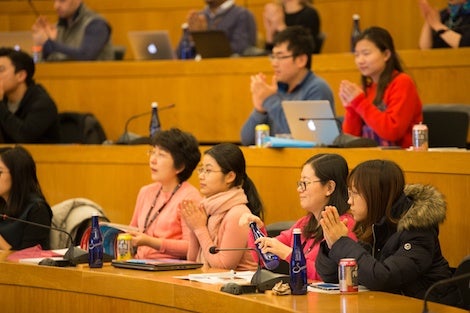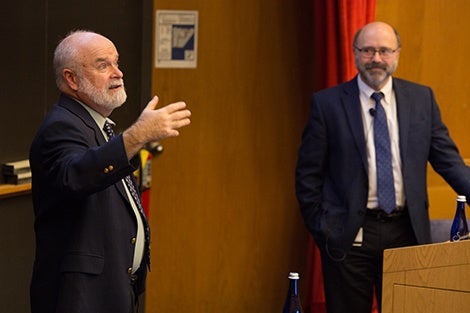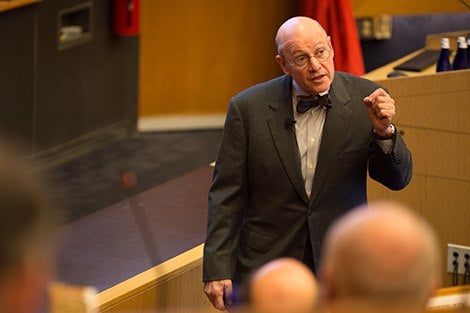December 18, 2017 – In an era when science is being questioned more than ever, Jeffrey Drazen, editor of the New England Journal of Medicine, thinks it’s crucial to share data from clinical trials so that results can be verified.
“Public trust is enhanced when nothing is hidden,” said Drazen, who gave the 166th Cutter Lecture on Preventive Medicine on December 8 at Harvard T.H. Chan School of Public Health.
The lecture was part of the 3rd Cutter Symposium on Clinical Epidemiology. Other speakers included Katrina Armstrong, JoAnn Manson, Alexander Walker, and E. Francis Cook.
Trials and trust
Drazen gave a brief history about the development of clinical trials—research studies that look at whether a medical strategy, treatment, or device is safe and effective for humans—and the important role they have played in improving medical care. For example, a 1931 study by James Burns Amberson—the first to be properly planned and controlled—showed that sanocrysin, a tuberculosis treatment in use at the time, was ineffective.

But other trials with questionable results led to an erosion of public trust in such studies, Drazen said. A 2001 trial known as “Study 329,” funded by drug maker SmithKline Beecham (now known as GlaxoSmithKline), concluded that Paxil (paroxetine) was safe and effective for children and adolescents with depression. But it later became known that certain data had been concealed and that the conclusions were false. The deception led New York Attorney General Elliot Spitzer to file a lawsuit against the company, which settled and agreed to post study results publicly.
Such controversies led to a 2007 federal law requiring that results from clinical trials be posted on a government database one year after the last patient enrolls. Compliance with the law now stands at roughly 60%, Drazen said. Non-compliance could result in the government imposing hefty personal fines on researchers or shutting down all clinical research at their universities. “They haven’t done it yet—and I don’t know if it’s going to happen with this administration—but it could happen,” he said.
Drazen hopes that sharing trial data continues to increase—not only to improve public trust in trial results but to give data scientists access to a wealth of information that could lead to new discoveries with the potential to benefit health.
Acknowledging uncertainty
Armstrong, Jackson Professor of Medicine at Harvard Medical School and chair of the Department of Medicine and Physician-in-Chief at Massachusetts General Hospital, spoke about the importance of acknowledging uncertainty in clinical epidemiology. As an example, she cited the difficulties inherent in assessing the benefits and risks of mammography screening for women in their 40s.
Manson, chief of the Division of Preventive Medicine at Brigham & Women’s Hospital, professor of medicine at Harvard Medical School, and a professor in Harvard Chan’s Department of Epidemiology, discussed the nuances in evidence about menopausal estrogen therapy. She said that, overall, evidence is clear that estrogen therapy can do more harm than good for older women, but can be safe and beneficial in easing menopausal symptoms in younger women.

Walker, adjunct professor of epidemiology at Harvard Chan, talked about the differences in how clinicians and epidemiologists approach health-related questions. Cook, professor of epidemiology, gave an overview of the history of training clinical epidemiologists at Harvard Chan School. Both were presented with the Epidemiology Distinguished Service Award.
photo: Sarah Sholes
